By Charlene Muhammad CHARLENEM
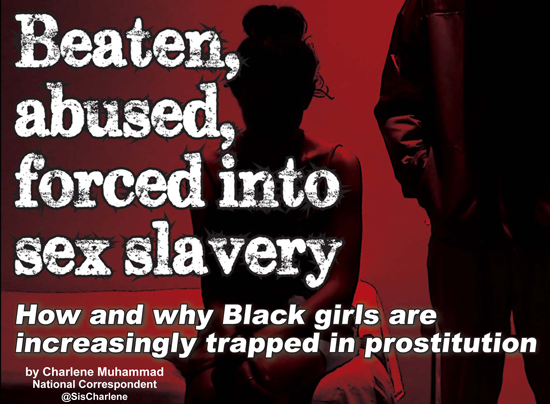
How and why Black girls are increasingly trapped in prostitution
COMPTON, Calif. – When neighborhood, religious and city leaders hit streets to raise awareness about the need to end increasing sales of Black women and girls on Long Beach Boulevard, they found child sex exploitation and human trafficking that reached far beyond their community hub.
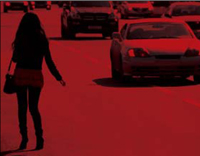
“Basically, why we’re calling attention to this is we did get news of an 8-year-old that was arrested,” said Paulette Simpson-Gipson, president of the Compton Branch of the NAACP. She’s also disheartened seeing young girls walking along the boulevard offering their bodies in exchange for money.
“It’s like an everyday occurrence. But we’re not back in slavery where someone can just say I want that little girl and sleep with them! Those are pedophiles. These are babies on the streets that are defenseless that are being victimized,” Ms. Simpson-Gipson said.
“Even if they’re 16, 17, these are minors. These are somebody’s children. We need to find out where they belong. They do not belong on the streets of Compton and if you were in Beverly Hills or in Palos Verdes or Santa Monica, you do not see little girls walking up and down the street like we should turn a blind eye to it. This is not acceptable!”
Compton City Attorney Craig Cornwell said the town known as the birthplace of gangsta rap has improved street lighting to try to deter sex crimes and other violations and that has had an impact.
But a particular area on Long Beach Boulevard, lined with churches, a mosque, and small businesses, remains a troublesome hotspot for prostitution, Attorney Cornwell explained. He’s reaching out to businesses and seeking partners to deal with a situation called by some the “new crack” epidemic.
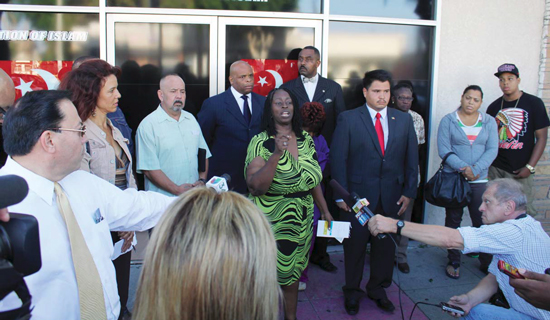
Pimping and preying on children
According to D’Lita Miller, pimps have discovered that unlike lifetime prison sentences for selling crack cocaine, no one cares about the commodification of Black women and girls.
Ms. Miller had to move her family away from Compton after her 16-year-old daughter fell into child sex trafficking through a teenage friend. Now the mother works to help free other young women who have fallen into the illicit life.
Atty. Cornwell has seen it play out in court. “There are cases where the more violent offenders are given priority in our jail system and I think that would not come as much of a surprise. I’ve seen the arrestees released prior to their first appearance in court, so you never even get an opportunity to resolve the case,” he said.
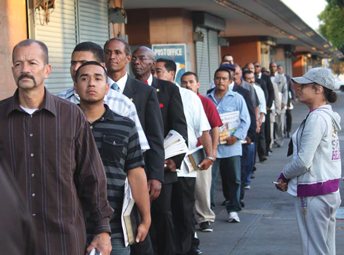
During a community walk and press conference over the summer, Student Minister Robert Muhammad of Muhammad Mosque No. 54 in Compton said the problem includes a culture of sexism and sexual exploitation of females.
“You can regularly go on YouTube and watch a young girl twerking as they would call it. That is a sexual dance. A whole culture is behind this so you should not be surprised when what you see behind closed doors comes out into the open,” he said.
According to Mr. Muhammad, one hotel manager admitted receipts from room rentals for prostitution amount to $9,000 to $10,000 a month. Until another product netting that amount can be found, the manager said he would keep renting rooms for sex, said the Nation of Islam student minister.
According to the Bureau of Justice, federal law enforcement task forces opened 2,515 investigations into suspected human trafficking between January 2008 and June 2010.
Of those investigations, 8 in 10 were classified as sex trafficking and 40 percent of all suspected trafficking incidents were child-related and classified as “prostitution or sexual exploitation of a child.”
The problem isn’t, however, limited to Compton or the West Coast
Claudine O’Leary, founder of Rethink Resources in Milwaukee, Wisc., and the Young Women’s Empowerment Project in Chicago, said people need to rethink their ideas about youth and the sex trade.
“It is my perspective that it is impoverished youth, Black youth, Latino youth, who are being way more targeted to be involved in prostitution and trafficking than other youth and Caucasian youth,” she told The Final Call.
People know these youth may be more vulnerable but have not cared and these youth have fewer options, coming from neighborhoods with 50 percent unemployment rates like those in Milwaukee, she continued.
“Pimps thrive off of the situations that already exist. They didn’t create the 50 percent unemployment rate. They just took advantage of it. They didn’t create the situation where the youth are sexually abused before they turn 10, 11, 12. They just take advantage of it. They don’t create the situation where youth are pushed out of school. They just take advantage of it,” Ms. O’Leary argued.
What youth really need and want are 24-hour drop in centers, otherwise, the cycle will continue, she warned.
Stalked and forced into sex work
Stacy Jewell Lewis was taken at 19-years-old in Washington, D.C., and held about 12 years by a pimp. She was able to escape when he was arrested on a murder charge, she told The Final Call.
She got trapped into prostitution on her way home from taking her son to his father’s house one night.
“I was asked by an elderly gentleman did I want a ride because the area I was walking in was not the best area to be walking in at night time. I knew that but I’d missed the bus,” Ms. Jewell Lewis recalled. She normally didn’t take rides from strangers but the area she’d need to pass was dangerous and ruthless.
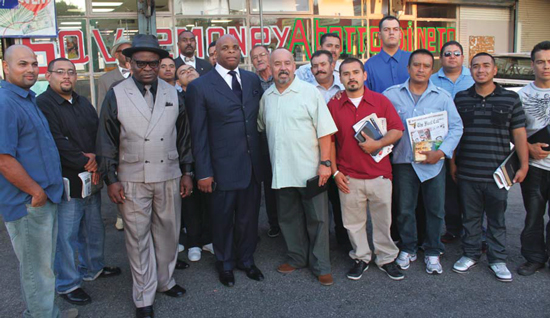
If the old man tried anything, she felt she could take him. Little did she know he was trained and paid to deliver girls to a pimp.
The pimp and his cohorts had been tracking her patterns, just as they do with many girls in urban areas, Ms. Jewell Lewis said.
Now 33, part of her continued healing process is to talk about her experience with young girls and through her one-woman play, “Seven Layers Captive.”
Part of the reason Black girls are targeted is they don’t look 12-years-old when they are, she said.
“We are 12. We will be 13 and 14, but if you see that girl and you put lipstick on her and fishnets on her, and a certain outfit on her, that 12-year-old will look 22, so that’s one reason our girls are a target, because they look of age when they’re not of age,” she explained.
Another reason is the Black community is notorious for not reporting missing teenage girls, often because the girls are in the foster care system, Ms. Jewell Lewis said. Typically no one’s looking for them and they’re categorized as runaways, she continued.
“For me this was 12 years ago, 2001, and I was 19. He says, ‘It’s not really safe out here. I’ll never forget that because he used the word safe. ‘Would you like a ride to the train station?’ His appearance, the word safe, a ride to the train station, which I was going to be walking about 6 to 7 blocks, it sounded really good. I took the risk,” she said.
Waiting around the corner was a pimp and an enforcer with a gun. Thank God she’d just delivered her son to his father, she thought at the time.
Her mind said, “Jump out of the car,” but her body was slow to react. The pimp made things simple and clear: He knew where she lived and recited the address she longed for at that moment.
Either she went with him or he visits her child, said the pimp.
The threat was very real, recalled Ms. Jewell Lewis. Faced with protecting her son’s life or her own, she surrendered. And at that moment, the “grandfather” handed the car back over to the pimp.
Then the brainwashing began, Ms. Jewell Lewis said. “He begins to make you feel like everything was your fault, just like predators do to victims. He says, ‘You chose to get in the old guy’s car,’ which you’re already beating yourself up, like ‘why did I take that ride from a stranger?’ ”
The barrage continued. “ ‘You chose to go with me instead of me hurting your child’ … and then the threat becomes, ‘now you can sleep with me freely or I can rape you or have these other people rape you,’ ” she recounted.
Ms. Jewell Lewis now uses her play to show the fullness of the manipulation and to show people why she and many girls like her just couldn’t walk away. For one, pimps isolate you, she said. In her case, the pimp forced her to call a family friend and tell her she was safe but just needed a break and was doing her own thing.
“How many African American parents are getting that call from their teenager right now? ‘I’m just doing my own thing. I don’t want to come home. I’m with my boyfriend.’ Does that sound familiar?” Ms. Jewell Lewis asked.
Ms. Jewell Lewis used her captor’s promise of bringing her back home to see her family as a source of hope to survive, but first she had to meet her quota: $3,000 in 30 days. That was 12 years ago. Nowadays, the average quota is $500 a day for each girl, she told The Final Call.
“The reality is we don’t call it modern day slavery for nothing. They use the same tactics as slave masters used on us as slaves and we do it to our own people. And the worst part about it is that these predators who are also often African American not only do it to their own people, it’s our children that they do it to.”
The difference between then and now is the average person can’t see it, Ms. Jewell Lewis said.
“I can’t say all but the majority of these young, African-American girls and White and Asian girls’ clients are White males. White men, White lawyers, doctors, politicians, family men, anyone you can think who are raping our children every day and arresting them. That is what we’re fighting against,” Ms. Jewell Lewis said.
Activist: Men have to stop sex slavery
Men Stopping Violence, an Atlanta-based program that works to end male violence toward women, discusses prostitution and sexual abuse in its classes. According to Sulaiman Nuriddin, men’s prevention program manager, prostitution is all about control, men being dominant, and feeling they have access to and control over women’s bodies.
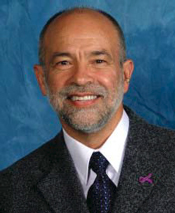
“Whenever we want to, it should be available to us; however, we want to use it and that’s part of the delivery that we get, part of our socialization, part of what male patriarchy teaches us about being in relationships and our expectations of women,” Mr. Nurridin said.
Some men take that expectation and manipulate female vulnerabilities for financial gain, he said. The way to stop the tragedy is to tackle generational problems and sexist beliefs about women that go along with it, Mr. Nurridin argued.
“Also it’s understanding that many of us grew up in places where we saw uncles, we saw dads, we saw men in our lives prostituting women and we felt that was part of the way we were supposed to be with women. So we felt it was no big thing and we grow up and carry that same thing on. Even our mothers were prostituted at times,” he said.
“And how do we speak to that because we’re carrying that hurt and pain and guilt and shame from what has happened in our own personal lives and we act it out.”
While prevalent, child sex trafficking is virtually invisible because sex trafficking and exploitation occurs where poverty is and that’s in the Black community, said Sarai Smith-Mazariegos, co-founder of Oakland-based MISSSEY (Motivating, Inspiring, Supporting and Serving Sexually Exploited Youth) and Alameda Family Service Nika’s Place program coordinator.
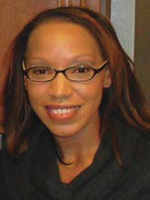
“We, the community, the public society, don’t really look at it until it has to do with a Caucasian child. Then it’s on the news, everyone’s talking about it, then there’s a police response. Then it’s oh, she’s a victim, but when it comes to a child that is African American, she’s not labeled as a victim. She is criminalized,” argued Ms. Smith-Mazariegos.
According to the FBI, more children were rescued from alleged pimps in San Francisco, Detroit and Milwaukee than in 76 cities over a three-day sweep in 2012. In all, the agency rescued 105 children and arrested 159 alleged pimps.
Unfortunately, in Black society, what’s happening on the streets is normalized and almost acceptable in its own culture, said Ms. Smith-Mazariegos. “‘That’s just the way it is,’ and ‘that’s what it is,’ signal it’s okay but clearly it’s not,” she said.
Pimps know well how to navigate “the ‘hood” because society glamorizes the lifestyle, but society’s sending the wrong messages and images to children growing up in poverty, she continued.
“You have clothing that advertises pimps and whores. You have Halloween costumes that advertise pimps and whores. Children have padded bras, G-strings and thongs marketed to little girls. And when it comes to our music, we have Three 6 Mafia, ‘It’s Hard Out Here for a Pimp!’ It was in the movie, ‘Hustle & Flow’ but that came from our rap artists that all the girls in the ‘hood and all the boys in the ‘hood listen to,” Ms. Smith-Mazariegos told The Final Call.
“No child in their right mind wakes up and says I’m going to go out there and sell my body to multiple men and while selling my body I’m going to allow 33 men to rape me. That doesn’t make any sense but yet, we sit there and say this child, because she’s a certain way, has made a choice to do that.”
She cited risk factors for sex trafficking in the Black community: Poverty, childhood sexual abuse, homelessness, runaways, loss of parents or caregivers, substance abuse, and inadequate supervision or care, particularly with babies having babies through teen pregnancy.
“At the end of the day, our people must stand up for our children, our daughters, and not look at it like what media tells us. ‘These girls are fast. These girls are runaways. They want to do it. Look at them.’ It’s not the case,” Ms. Jewell Lewis said.
She survived by holding on to her faith in Jesus Christ, and she was blessed to escape. But, many girls, unless they’re arrested or their traffickers are arrested, become consumed by “the life.” They move from place to place, pimp to pimp in the street life, she lamented.
“Just believe first because that’s the number one thing, especially in the African American community, but especially in America. We just don’t believe it’s happening here. We can say yeah, it’s happening in Thailand. Yeah, it’s happening in this country, that country, but we don’t believe it’s happening before our very eyes. And until we believe it, we won’t be able to do anything,” Ms. Jewel Lewis said.












